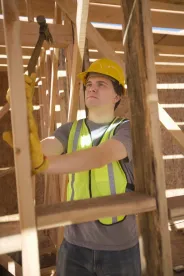While many contractors may not be aware of the existence of the New Jersey Prompt Payment Act, its application to construction litigation where payment is sought under either a general-contract or sub-contract is important to the industry. This act was created in order to provide a remedy to both general contractors and subcontractors when payment has been wrongfully withheld by an upper-tier contractor or owner despite the fact that work had been approved and certified for payment. This act is codified under N.J.S.A. 2A:30A-2. By pleading a cause of action under the Prompt Payment Act in construction litigation, a contractor may shorten the time frame when they receive payment from an owner or an upper-tier contractor.
Section A of the New Jersey Prompt Payment Act provides that if a prime contractor has performed in accordance with the provisions of a contract with the owner and the billing for the work has been approved and certified by the owner or the owner’s authorized approving agent, the owner shall pay the amount due to the prime contractor for each periodic payment, final payment, or retainage monies not more than 30 calendar days after the billing date. This section provides strict guidelines as to payments to a prime contractor once a payment application has been approved. Subsection B of the act addresses payment to a subcontractor or sub-subcontractor. This section provides that if a subcontractor or sub-subcontractor has performed in accordance with the provisions of its contract with the prime contractor or subcontractor and the work has been accepted by the owner, the owner’s authorized approving agent, or the prime contractor, as applicable, and the parties have not otherwise agreed in writing, the prime contractor shall pay to its subcontractor and the subcontractor shall pay to its sub-subcontractor within 10 calendar days of receipt of each periodic payment, final payment, or receipt of retainage monies, the full amount received for the work of the subcontractor or sub-subcontractor based on the work completed or the services rendered under the applicable contract.
If payment is not timely made under either section of the act as set forth above, subsection C of the statute comes into play, which provides that the delinquent party shall be liable for the amount of money owed under the contract plus interest at the rate equal to the prime rate plus 1%. Furthermore, under subsection D a contractor, subcontractor, or sub-subcontractor may, after providing seven days written notice of the failure to tender timely payment, suspend performance of the contract without penalty for breach of contract, until such time as the required payment is made. Finally, and perhaps and most important, any civil action brought to collect payments pursuant to subsection F, shall be filed within the State of New Jersey, and moreover, the prevailing party shall be awarded reasonable counsel fees and costs of suit.
As noted, the New Jersey Prompt Payment Act provides a strict time structure pursuant to which payments are due from an owner, prime contractor or subcontractor to parties which they retained to provide materials and services. If this schedule is not complied with penalties such as pre-judgment interest, as well as counsel fees and costs may be imposed if the contractor files suit and prevails. Likewise, it also provides the subcontractor or prime contractor with the ability to suspend work without any repercussions if payment is not made pursuant to an approved payment application. As such, the New Jersey Prompt Payment Act strongly favors a contractor who is entitled to an undisputed payment.



 />i
/>i

